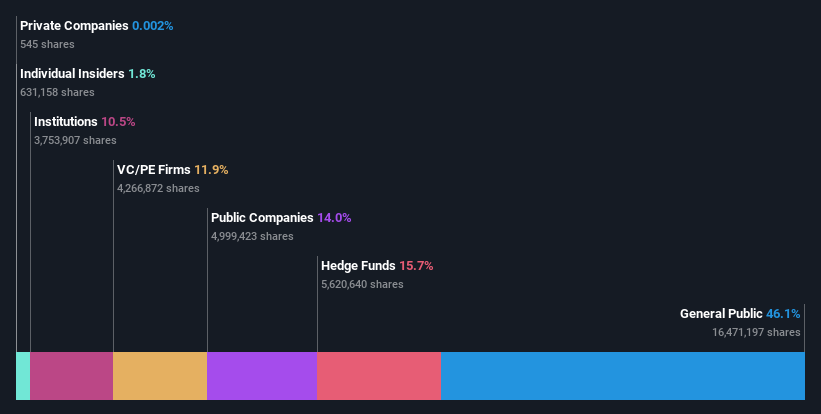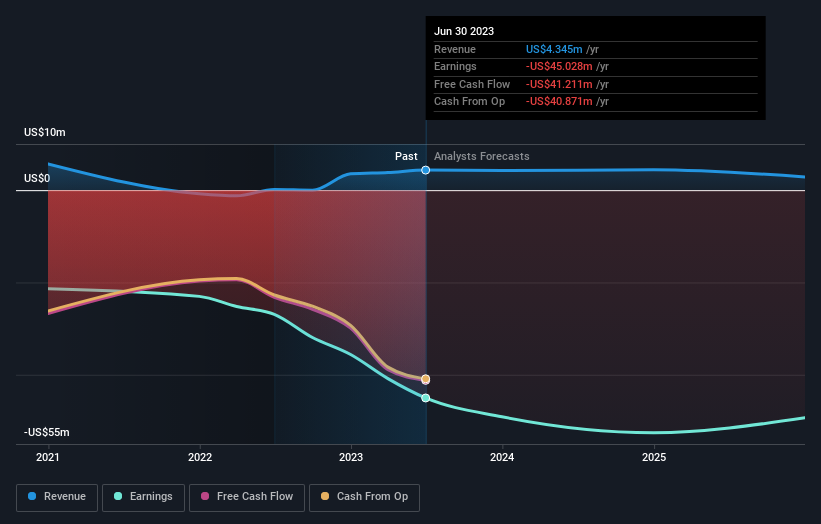- United States
- /
- Medical Equipment
- /
- NasdaqGM:OBIO
Retail investors among Orchestra BioMed Holdings, Inc.'s (NASDAQ:OBIO) largest shareholders, saw gain in holdings value after stock jumped 22% last week

Key Insights
- The considerable ownership by retail investors in Orchestra BioMed Holdings indicates that they collectively have a greater say in management and business strategy
- The top 12 shareholders own 50% of the company
- 11% of Orchestra BioMed Holdings is held by Institutions
If you want to know who really controls Orchestra BioMed Holdings, Inc. (NASDAQ:OBIO), then you'll have to look at the makeup of its share registry. The group holding the most number of shares in the company, around 46% to be precise, is retail investors. That is, the group stands to benefit the most if the stock rises (or lose the most if there is a downturn).
As a result, retail investors were the biggest beneficiaries of last week’s 22% gain.
Let's delve deeper into each type of owner of Orchestra BioMed Holdings, beginning with the chart below.
View our latest analysis for Orchestra BioMed Holdings

What Does The Institutional Ownership Tell Us About Orchestra BioMed Holdings?
Institutions typically measure themselves against a benchmark when reporting to their own investors, so they often become more enthusiastic about a stock once it's included in a major index. We would expect most companies to have some institutions on the register, especially if they are growing.
We can see that Orchestra BioMed Holdings does have institutional investors; and they hold a good portion of the company's stock. This suggests some credibility amongst professional investors. But we can't rely on that fact alone since institutions make bad investments sometimes, just like everyone does. It is not uncommon to see a big share price drop if two large institutional investors try to sell out of a stock at the same time. So it is worth checking the past earnings trajectory of Orchestra BioMed Holdings, (below). Of course, keep in mind that there are other factors to consider, too.

It would appear that 16% of Orchestra BioMed Holdings shares are controlled by hedge funds. That worth noting, since hedge funds are often quite active investors, who may try to influence management. Many want to see value creation (and a higher share price) in the short term or medium term. Looking at our data, we can see that the largest shareholder is RTW Investments, LP with 16% of shares outstanding. In comparison, the second and third largest shareholders hold about 14% and 6.8% of the stock. Additionally, the company's CEO David Hochman directly holds 0.6% of the total shares outstanding.
Looking at the shareholder registry, we can see that 50% of the ownership is controlled by the top 12 shareholders, meaning that no single shareholder has a majority interest in the ownership.
While studying institutional ownership for a company can add value to your research, it is also a good practice to research analyst recommendations to get a deeper understand of a stock's expected performance. There is some analyst coverage of the stock, but it could still become more well known, with time.
Insider Ownership Of Orchestra BioMed Holdings
The definition of an insider can differ slightly between different countries, but members of the board of directors always count. Company management run the business, but the CEO will answer to the board, even if he or she is a member of it.
Most consider insider ownership a positive because it can indicate the board is well aligned with other shareholders. However, on some occasions too much power is concentrated within this group.
Our most recent data indicates that insiders own some shares in Orchestra BioMed Holdings, Inc.. In their own names, insiders own US$5.4m worth of stock in the US$307m company. It is good to see some investment by insiders, but it might be worth checking if those insiders have been buying.
General Public Ownership
The general public-- including retail investors -- own 46% stake in the company, and hence can't easily be ignored. This size of ownership, while considerable, may not be enough to change company policy if the decision is not in sync with other large shareholders.
Private Equity Ownership
With a stake of 12%, private equity firms could influence the Orchestra BioMed Holdings board. Sometimes we see private equity stick around for the long term, but generally speaking they have a shorter investment horizon and -- as the name suggests -- don't invest in public companies much. After some time they may look to sell and redeploy capital elsewhere.
Public Company Ownership
Public companies currently own 14% of Orchestra BioMed Holdings stock. We can't be certain but it is quite possible this is a strategic stake. The businesses may be similar, or work together.
Next Steps:
It's always worth thinking about the different groups who own shares in a company. But to understand Orchestra BioMed Holdings better, we need to consider many other factors. Consider for instance, the ever-present spectre of investment risk. We've identified 3 warning signs with Orchestra BioMed Holdings (at least 1 which doesn't sit too well with us) , and understanding them should be part of your investment process.
If you would prefer discover what analysts are predicting in terms of future growth, do not miss this free report on analyst forecasts.
NB: Figures in this article are calculated using data from the last twelve months, which refer to the 12-month period ending on the last date of the month the financial statement is dated. This may not be consistent with full year annual report figures.
New: AI Stock Screener & Alerts
Our new AI Stock Screener scans the market every day to uncover opportunities.
• Dividend Powerhouses (3%+ Yield)
• Undervalued Small Caps with Insider Buying
• High growth Tech and AI Companies
Or build your own from over 50 metrics.
Have feedback on this article? Concerned about the content? Get in touch with us directly. Alternatively, email editorial-team (at) simplywallst.com.
This article by Simply Wall St is general in nature. We provide commentary based on historical data and analyst forecasts only using an unbiased methodology and our articles are not intended to be financial advice. It does not constitute a recommendation to buy or sell any stock, and does not take account of your objectives, or your financial situation. We aim to bring you long-term focused analysis driven by fundamental data. Note that our analysis may not factor in the latest price-sensitive company announcements or qualitative material. Simply Wall St has no position in any stocks mentioned.
About NasdaqGM:OBIO
Slight with mediocre balance sheet.
Market Insights
Community Narratives




